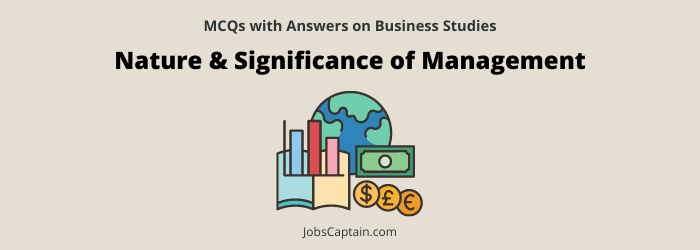
| Quiz | 1 | 2 |
| Return to MCQs with Answers on Business Studies | ||
(A) Management
(B) Both
(C) Effective
(D) Efficiency
Question 2. The objective of the Marketing Department of ‘KOTEX Ltd.’ is to increase sales by 10 per cent by offering discounts. But, the finance department may not approve of such discounts as it means loss of revenue. These kinds of conflict arise in organizations because each department performing activities in isolation from others and barriers between departments are becoming more rigid. Identify the point of importance of coordination to which this case is related __________.
(A) Growth in size
(B) Specialization
(C) Functional differentiation
(D) None of these
Question 3. Policy formulation is the function of __________.
(A) Top level Managers
(B) Operational Management
(C) Middle level Managers
(D) None of the above
Question 4. Goal setting is the function of __________.
(A) Superintendent
(B) Supervisor
(C) Foreman
(D) CEO
Question 5.How does a manager want to achieve his objectives?
(A) Efficiently
(B) Efficiently and effectively
(C) Effectively
(D) None of the above
Question 6.Successful organizations do not achieve goals by chance but by following a deliberate process known as ________.
(A) Management
(B) Controlling
(C) Co-ordination
(D) Planning
Question 7. Which one of the following sequences of process of management is correct ___________.
(A) Organising, Planning, Staffing, Controlling, Directing
(B) Planning, Organising, Staffing, Directing, Controlling
(C) Directing, Staffing, Planning, Organising, Controlling
(D) Planning, Directing ,Controlling, Organising, Staffing
Question 8. Which degree is compulsory to become a manager?
(A)B.B.A.
(B) M.B.A.
(C) M.Com.
(D) No compulsion of degree.
Question 9. In which of the following occupation, no minimum qualification is prescribed?
(A) Chartered Accountant
(B) Lawyer
(C) Doctor
(D) Manager
Question 10. Managing Director will be considered under which level of management?
(A) Top-level
(B) Lower-level
(C) Middle-level
(D) None of these
Question 11. Foreman will be considered under which level of management?
(A) Lower-level
(B) Top-level
(C) Middle – level
(D) None of these
Question 12. Management is essential for the organizations which are _________.
(A) Non-profit organizations
(B) Social organizations
(C) Service organizations
(D) All of the above
Question 13. Successful management ensures that ________.
(A) Goals are achieved with least cost
(B) Both of the above
(C) Timely achievement of goals
(D) None of the above
Question 14.Ravi works as a production manager in Rosy private Limited. He has been given the task of getting 10000 units of hand woven table mats manufactured at the cost of ₹150 per unit, within 100 days. In order to be acknowledged as an effective manager, he must ensure that _________.
(A) The cost of production does not exceed ₹150 per unit
(B) The cost of production is less than ₹150 per unit
(C) The work is completed within 100 days even at higher cost per unit
(D) All of the above
Question 15. Management is said to be poor if it is _______________.
(A) Efficient but ineffective
(B) Both inefficient and ineffective
(C) Effective but inefficient
(D) All of the above
Question 16.Suzy Enterprises Limited is planning to increase its sales by 25% in the next year. Identify the feature of management being highlighted in the given statement.
(A) Management is all pervasive
(B) Management is a continuous process
(C) Management is a goal oriented process
(D) All of the above
Question 17.Keeping in view ,the changes in the consumer demands and preferences,Royal Bakery‘ has reduced the sugar and fat content in its products. This approach of business shows that management is _______.
(A) A multidimensional activity
(B) A dynamic function
(C) A group activity
(D) An intangible force
Question 18. Management is considered to be an art because __________.
(A) It is not important for the practicing managers to be a member of a professional association.
(B) Different principles of management are brought into effect differently by different managers
(C) The principles of management have universal application
(D) The principles of management have universal validity
Question 19. ‘Corrective action’ comes under which function of management?
(A) Controlling
(B) Directing
(C) Organising
(D) Planning
Question 20.Match the concept of management in Column I with their respective meaning in II:
| COLUMN I | COLUMN II |
| (A) Effectiveness | i) Doing the task correctly with minimum cost. |
| (B) Efficiency | ii) Finishing the task on time. |
| (C) Process | iii) The primary functions or activities that management performs to get. |
(A) i), iii), ii)
(B) iii), ii), i)
(C) ii), i), iii)
(D) i), ii), iii)
Question 21. Match the objective of management in Column I with their respective definition in Column II:
| Column I | Column II |
| A)Survival | i)Increase in the number of employees, the number of products or increase in the capital investment, etc |
| B)Profit | ii)A Vital Incentive for the continued successful operation of the enterprise |
| C)Growth | iii)An organisation must earn enough revenues to cover costs. |
(A) i), iii), ii)
(B) ii), iii), i)
(C) ii),i), iii)
(D) i), ii), iii)
| Quiz | 1 | 2 |
